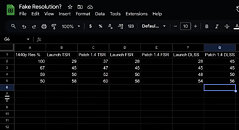Wuchang: Fallen Feathers Dev Seemingly Disabled Native Render Resolution on Certain Hardware To Fix Performance Issues
Last week, we reported on Wuchang: Fallen Feathers and its launch that was ruined by poor optimization and abysmal performance on even high-end PCs. In response to the plummeting Steam review score, 505 Games put out a patch that was supposed to improve performance by reducing RAM and VRAM usage, optimizing performance on low-end GPUs, and addressing performance and stability bugs. This patch was followed by Patch 1.4, which supposedly addressed performance on "certain hardware models." A recent analysis by Daniel Owen on YouTube has revealed that the Wuchang: Fallen Feathers 1.4 patch may have removed native rendering from the game entirely, effectively forcing players to use upscaling, even when the resolution scale is set to 100%.
As Owen demonstrates in his YouTube video, the only change in the patch notes that mentions sampling resolutions reads: "Supersampling resolution limits have been adjusted on select GPU models to prevent unintended performance degradation." This seems to imply that the option to enable higher resolution scaling options was removed for lower-end GPUs, but that may not be the case. As Owen demonstrates, before the 1.4 update, performance scales predictably with the oversampling resolution slider—if you drop the resolution below 100%, the performance increases, regardless of whether the game is using FSR, DLSS, or TSR. After updating the game to the 1.4 patch, there is a significant performance boost at the same 100% resolution scale, and the running theory is that the developers are simply capping the render resolution at somewhere below native, regardless of which settings the player enables in the graphics options. This is demonstrated when Owen drops the resolution scale to similar levels as he tested prior, and performance is just 2 FPS higher than what was observed before the update on TSR and FSR, with DLSS getting identical performance in one instance.
As Owen demonstrates in his YouTube video, the only change in the patch notes that mentions sampling resolutions reads: "Supersampling resolution limits have been adjusted on select GPU models to prevent unintended performance degradation." This seems to imply that the option to enable higher resolution scaling options was removed for lower-end GPUs, but that may not be the case. As Owen demonstrates, before the 1.4 update, performance scales predictably with the oversampling resolution slider—if you drop the resolution below 100%, the performance increases, regardless of whether the game is using FSR, DLSS, or TSR. After updating the game to the 1.4 patch, there is a significant performance boost at the same 100% resolution scale, and the running theory is that the developers are simply capping the render resolution at somewhere below native, regardless of which settings the player enables in the graphics options. This is demonstrated when Owen drops the resolution scale to similar levels as he tested prior, and performance is just 2 FPS higher than what was observed before the update on TSR and FSR, with DLSS getting identical performance in one instance.



















